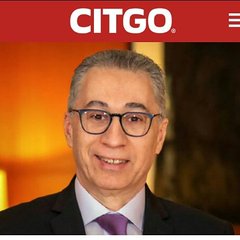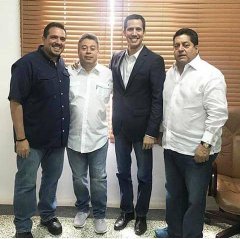Did Venezuelan Coup Leaders Pocket $70 Million From Citgo's Stolen US Assets?
22 June, 2019
Venezuela’s government has claimed the Department of Justice will investigate Citgo’s opposition-appointed board for the theft of $70 million. But the board is itself the product of a massive theft – that of the elected government’s wealth.
Former Exxon Lawyer and Venezuela opposition envoy to Washington, Carlos Vecchio, may have overseen a multi-million dollar fraud scheme since his political allies were handed control of his country’s US-based oil accounts.
On June 17, Venezuela’s government claimed that the US Justice Department was opening an investigation into Citgo’s opposition-appointed board of directors. Hours later, the ad-hoc council confirmed it had received a subpoena from US officials.
Citgo appeared to confirm the existence of the US government probe, stating that it “received a subpoena from the Department of Justice, which has been conducting a multi-year investigation into corruption practices in PDVSA.” Citgo is a subsidiary of Petroleum of Venezuela (PDVSA), the country’s state-owned oil company.
Citgo said it has “pledged full cooperation” with the investigation. It did not specify the nature of the subpoena or whether it concerned illegal activities alleged to have taken place before or after Guaido’s appointees took control of the company.
Citgo’s announcement followed an ominous comment by Venezuela’s Vice Minister of Communications on June 17:
“It is very likely that the United States Department of Justice will open an ad hoc investigation into the fake board of directors that Juan Guaidó appointed to the Citgo company,” Rodriguez proclaimed during a presentation from Venezuela’s presidential palace.
According to Rodriguez, the investigation was sparked by an alleged accounting fraud totaling $70 million. Rodriguez asserted the money, originally meant to cover PDVSA’s 2020 bond payment due in April, was stolen by Guaido’s representative in the US.
“It seems like the person directly involved in having pocketed those $70 million in excesses, due to cooking the books, is Mr. Carlos Vecchio,” charged Rodriguez.
The allegations of theft on a mass scale came just a day after members of Guaidó’s inner circle were exposed for embezzling $125,000 in money intended for humanitarian aid, spending it on expensive hotels and luxury items in Colombia.
Guaidó’s coup administration is not only facing a collapse of its credibility, but now the possibility of serious legal consequences for its brazen conduct.
Asked by The Grayzone about the existence of an investigation into the opposition’s Citgo accounts, the US Department of Justice stated that it “generally does not confirm, deny or otherwise comment on the existence or non-existence of an investigation.”
Stacking Citgo’s board with corporate consultants and pre-Chavez oil executives
The Trump Administration recognized Vecchio as Venezuela’s ambassador to Washington in January, after he was appointed by Guaidó.
Vecchio has since surrounded himself with an entourage of professional opposition activists in Washington DC. They include David Smolansky, a former local official from Vecchio’ Popular Will party who was appointed to PDVSA’s board of directors by the opposition-controlled National Assembly this February.
Vecchio did not reply to questions sent by The Grayzone pertaining to the management of Citgo accounts and where he finds the funding to cover his salary and those of his staff.
“Why doesn’t Guaidó have appointed ministers?” Rodriguez asked, insisting that the US-appointed leader had selected “representatives of Citgo to steal $7 billion.”“We have information that interests which belong to Citgo are moving to personal accounts,” the government spokesman added.
$7 billion represents the entirety of PDVSA’s US-based assets seized by the US in January when it rolled out unprecedented sanctions targeting Venezuela’s oil industry. In conjunction with the Trump Administration’s announcement, Guaidó ordered Venezuela’s legally defunct National Assembly to appoint a new board of directors to PDVSA and Citgo.
Within weeks, Reuters reported the new Citgo board “was arranging its first meeting at the company’s headquarters” in Houston.
“It seems like the U.S. legal system will generally accept the legal fiction that PDVSA, Citgo’s sole shareholder, is controlled by Guaidó rather than by the people in Venezuela who actually control it,” Bloomberg opinion columnist Matt Levine wrote at the time, highlighting the bizarre character of the move.
The Guaidó-appointed board was subsequently stacked with corporate consultants and former PDVSA employees who were forced out of the company under the watch of the late Venezuelan President Hugo Chavez.
Citgo’s new chairwoman, Luisa Palacios, previously served as chief of Latin America Macro and Energy Research at Medley Global Advisors, which bills itself as “the leading macro policy intelligence service for the world’s top hedge funds, investment banks, asset managers and corporations”.
While at MGA, Palacios’ job was to “[provide] primary-sourced intelligence and analysis on economic policy and political risk”. In other words, a woman who just months ago was advising hedge funds and corporations on Latin America energy policy now heads a major Latin American-based energy company.
Palacios has also worked as a strategist for British investment bank Barclays Capital and as a consultant at the World Bank’s Latin America division.
Joining Palacios on Citgo’s opposition-appointed board is financial analyst Andres Elloy Padilla. In an instance of flagrant nepotism, Padilla’s nomination was overseen by his brother, Luis Carlos, who was the Vice President of the Energy and Petroleum Commission of the National Assembly where nominations were decided.
Guaidó’s board also includes Luis Urdaneta, who once served as Citgo’s Chairman before becoming PDVSA’s Vice President in 1994. Urdaneta remained in that role until Hugo Chavez won power in 1998 and moved to fully socialize the company. Urdaneta’s colleague on Citgo’s new team, Angel Olmeta, similarly retired from his position on PDVSA’s board in 1998. While employed with PDVSA, Olmeta oversaw its acquisition of Citgo and went on to serve as the refinery’s Executive Vice President and Chief Operating Officer.
As former oil industry executives who saw their employment end with Chavez’s rise, Urdaneta and Olmeta have much in common with Guaidó’s US envoy, Carlos Vecchio. Vecchio enjoyed a successful career with private petrol, working as a tax lawyer for PDVSA before the rise of Chavez, then moving to ExxonMobil.
As The Grayzone reported, Vecchio led Exxon’s legal fight against the Chavez government and only entered the political arena once Chavez drove his former employer from the country.
As Guaidó’s US ambassador, Vecchio now stands accused of overseeing the embezzlement of $70 million from Citgo’s accounts. He has dismissed the reports, insisting his role as ambassador limits his involvement in Citgo’s affairs.
“I am not a part of PDVSA or Citgo’s board of directors, nor am I interested in being such,” Vecchio tweeted in response to the charges.
“We need to take control of those assets. Bank accounts, we need to protect that.”
While it’s unclear who exactly controls the assets handed over to Guaido earlier this year, Foreign Agent Registration Act filings list Vecchio as the “Foreign Principal” of “the Bolivarian Republic of Venezuela under President Juan Guaidó” in the US. The DOJ deleted that filing without explanation shortly after its publication.
“We have assets that belong to the republic. I represent the republic and [am] working on that,” Vecchio told Public Radio International in February when asked whether or not it was legal for him to manage Venezuela’s accounts.“We need to take control of those assets,” he added.
When PRI asked what could “get done without an official embassy”, Vecchio replied without hesitation: “Bank accounts, we need to protect that. Gold reserves, we need to protect that and also public companies or corporations such as Citgo… So that’s what we are doing.”
What precisely Vecchio planned to do with the money was unknown, but his comments have taken on new meaning in light of the alleged fraud inquiry.
By transferring billions in oil assets belonging to the Venezuelan government into the hands of a group of opposition activists with a track record of corruption, the Trump administration has primed the pump for major scandals. Whether the former Exxon lawyer Vecchio and his cohort pocketed the Citgo accounts or “protected” them, as he pledged to do, the pilfering of Venezuela’s wealth through a slow-motion coup has already begun.







No comments:
Post a Comment
Note: only a member of this blog may post a comment.